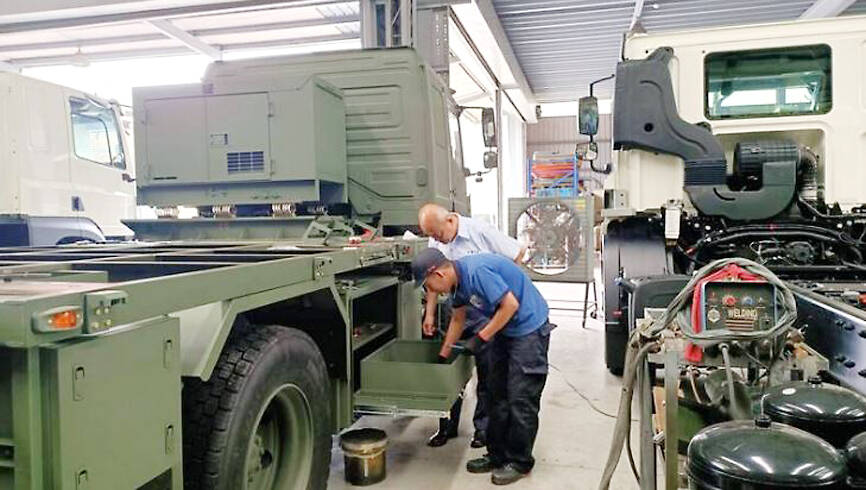A defense contractor has urged the military to streamline its sourcing of motor vehicle parts, as a lack of standardization has strained combat units and the contractors charged to supply their logistics.
Taiwan’s armed forces operate too many vehicle types that were produced at a low volume by a diverse group of manufacturers based in different countries, Champion Auto chairman Lee Ta-wei (李大偉) said last week.
An air defense unit with Tien Kung III air defense missile systems uses combat vehicles made in four countries, while the power plants of the vehicles were produced by seven distinct domestic manufacturers and supplied from seven licensed sources of parts, Lee said.

Photo courtesy of Champion Auto
The situation is trying for frontline military units and the contractors they rely on to sustain their equipment, he said, adding that Champion Auto — a company with about 240 employees — is not alone in having to service thousands of military vehicles with a small pool of resources.
Moreover, vendors are afraid to build up a large stockpile of parts because of the risks associated with vying for limited two-year military logistics contracts, he said.
Military service members often buy equipment parts out of pocket, while contractors have been forced to buy components from dubious sources, he said, adding that sometimes the contractors do not know where the parts they obtained originated.
Dealing with a great variety of equipment and components has overwhelmed many company commanders who cannot memorize the methods of operation or first-line maintenance procedures for the vehicles in their command, he said.
Institute of National Defense and Security Research analyst Shen Ming-shih (沈明室) said that complicated sourcing arrangements and the prominence of high-variety, low-volume production of military systems have led to logistical and sustainment difficulties.
A redesign of regulations governing defense contracts might be needed to improve the situation, he said.
The bureaucratic administrators of the military tend to cut logistics budgets before taking measures that would reduce the number of systems being fielded, he said.
Although the Ministry of National Defense tries to mitigate risks by using a centralized strategic reserve of parts and placing a greater reliance on the civilian sector, insufficient funding for military logistics is exerting a hidden toll on capabilities, he said.

The Coast Guard Administration (CGA) yesterday said it had deployed patrol vessels to expel a China Coast Guard ship and a Chinese fishing boat near Pratas Island (Dongsha Island, 東沙群島) in the South China Sea. The China Coast Guard vessel was 28 nautical miles (52km) northeast of Pratas at 6:15am on Thursday, approaching the island’s restricted waters, which extend 24 nautical miles from its shoreline, the CGA’s Dongsha-Nansha Branch said in a statement. The Tainan, a 2,000-tonne cutter, was deployed by the CGA to shadow the Chinese ship, which left the area at 2:39pm on Friday, the statement said. At 6:31pm on Friday,

The Chinese People’s Liberation Army Navy’s (PLAN) third aircraft carrier, the Fujian, would pose a steep challenge to Taiwan’s ability to defend itself against a full-scale invasion, a defense expert said yesterday. Institute of National Defense and Security Research analyst Chieh Chung (揭仲) made the comment hours after the PLAN confirmed the carrier recently passed through the Taiwan Strait to conduct “scientific research tests and training missions” in the South China Sea. China has two carriers in operation — the Liaoning and the Shandong — with the Fujian undergoing sea trials. Although the PLAN needs time to train the Fujian’s air wing and

STRIKE: Some travel agencies in Taiwan said that they were aware of the situation in South Korea, and that group tours to the country were proceeding as planned A planned strike by airport personnel in South Korea has not affected group tours to the country from Taiwan, travel agencies said yesterday. They added that they were closely monitoring the situation. Personnel at 15 airports, including Seoul’s Incheon and Gimpo airports, are to go on strike. They announced at a news conference on Tuesday that the strike would begin on Friday next week and continue until the Mid-Autumn Festival next month. Some travel agencies in Taiwan, including Cola Tour, Lion Travel, SET Tour and ezTravel, said that they were aware of the situation in South Korea, and that group

Taiwanese celebrities Hank Chen (陳漢典) and Lulu Huang (黃路梓茵) announced yesterday that they are planning to marry. Huang announced and posted photos of their engagement to her social media pages yesterday morning, joking that the pair were not just doing marketing for a new show, but “really getting married.” “We’ve decided to spend all of our future happy and hilarious moments together,” she wrote. The announcement, which was later confirmed by the talent agency they share, appeared to come as a surprise even to those around them, with veteran TV host Jacky Wu (吳宗憲) saying he was “totally taken aback” by the news. Huang,